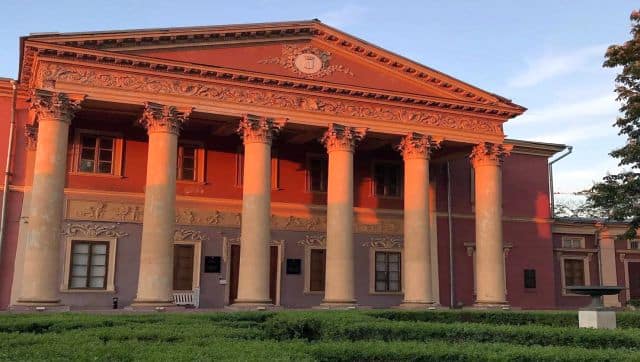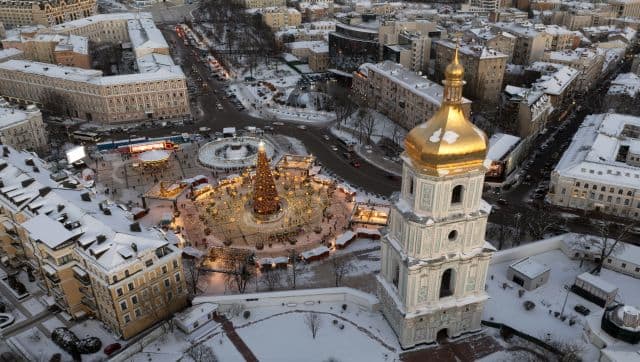A “cultural catastrophe” is unfolding in the ongoing invasion of Ukraine by Russian forces as millions of priceless artworks, artefacts and monuments are at risk of being destroyed in the onslaught. J Paul Getty Trust, a global arts organisation, condemned the destruction of cultural heritage in Ukraine and said that the Russian forces have “deliberately burned to the ground” the Ivankiv Museum north of Kyiv, which housed precious Ukrainian folk art. Parallel to the risk to human life and infrastructure is the risk Ukraine faces to have its cultural heritage destroyed that represents centuries of history from Byzantine to the Baroque periods, as well as UNESCO World Heritage sites. Let’s take a look at what all is at risk of being lost in Ukraine during Russia’s military operation: Cultural heritage at risk of destruction Thousands of museums across Ukraine store important works of art by Ukrainian and Russian artists, Byzantine artefacts and paintings by masters such as Giovanni Bellini, Francisco Goya and Jacques-Louis David, as per a report by the Indian Express. Founded in 2014, the Museum of Freedom in Kyiv has a collection of around 4000 objects. Most of these record Ukraine’s pro-democracy movement and are at the risk of being destroyed by Russian forces. [caption id=“attachment_10425531” align=“alignnone” width=“640”]  The Odessa National Fine Arts Museum houses more than 10,000 pieces of art, including works by some of the best-known Russian and Ukrainian artists from as early as the 16th century. Image Courtesy: odesa_finearts_museum/Instagram[/caption] A far more culturally-important institution is the Odessa National Fine Arts Museum, which was founded in 1899. The museum houses more than 10,000 pieces of art, including works by some of the best-known Russian and Ukrainian artists from as early as the 16th century. Some of the artists featured at the museum are Ivan Aivazovskyi, Myhailo Vrubel, Valentyn Sierov, Mykola Reryh, Zinaida Serebriakova, Kostiantyn Somov, and Vasyl Kandynskyi. The country is also home to seven world heritage sites, including the 11th century St Sophia Cathedral in Kyiv, and Kyiv-Pechersk Lavra, also known as the Kyiv Monastery of the Caves, an Orthodox monastery founded in 1051. The entire old quarter of Lviv that dates back to the 13th century is also a world heritage site. The city of Kharkiv, which has been under heavy attack by Russian forces, is also home to a number of museums, cathedrals, and historic neighbourhoods. [caption id=“attachment_10425591” align=“alignnone” width=“640”]  File image of St Sophia Cathedral, foreground, and St Michael Cathedral, background, in Kyiv. AP[/caption] What has been lost so far Ukraine’s Ministry of Foreign Affairs tweeted on 28 February that the Ivankiv Historical and Local History Museum was burned to the ground in the Russian assault.
As a result of 🇷🇺 invasion, about 25 works by outstanding 🇺🇦 artist Mariia Pryimachenko were burned. The paintings were stored in Ivankiv Museum, Kyiv region. She created world-famous masterpieces. Her special gift and talent captivated Pablo Picasso.
— MFA of Ukraine 🇺🇦 (@MFA_Ukraine) February 28, 2022
🖼️“Two-headed chicken, 1977” pic.twitter.com/dfAyfkn1k9
It said that 25 paintings by celebrated Ukrainian artist Maria Prymachenko were also burned during the assault. In the honour of the artist, who had captivated Spanish master Pablo Picasso with her talent, UNESCO had declared 2009 as the year of Prymachenko. “I bow down before the artistic miracle of this brilliant Ukrainian,” Picasso had said for her work. A Russian airstrike in Kyiv on Tuesday knocked down some state broadcasting towers as struck the Babyn Yar Holocaust memorial in Kyiv. Babyn Yar is a memorial the mass execution of over 33,000 Jews by Nazi forces in 1941 during World War II. Ukrainian president Volodymyr Zelenskyy tweeted that history was repeating itself.
To the world: what is the point of saying «never again» for 80 years, if the world stays silent when a bomb drops on the same site of Babyn Yar? At least 5 killed. History repeating…
— Volodymyr Zelenskyy / Володимир Зеленський (@ZelenskyyUa) March 1, 2022
**Also read: Russian missiles strike Kyiv's Babyn Yar: All you need to know about this World War II memorial site** Steps taken to limit damage According to The Guardian, four museums in Vinnytsia, Zhytomyr, Sumy and Chernihiv managed to “take down and protect their main exhibitions. In Vinnytsia, the museum building is now partly used for internally displaced people. So far I have not heard that any of the aforementioned museums has been subject to looting or attack.” The same report quotes Fedir Androshchuk, the director of the National Museum of the History of Ukraine in Kyiv. He said they were attempting to safeguard the museum from attack or looting. “The museum is located in the middle of a rich cultural heritage area near three fine churches, but also close to some possible targets (the Ukrainian security service and border forces),” he wrote in an email to a Swedish academic, as quoted by The Guardian. With inputs from agencies Read all the Latest News , Trending News , Cricket News , Bollywood News , India News and Entertainment News here. Follow us on Facebook, Twitter and Instagram.


)

)
)
)
)
)
)
)
)



